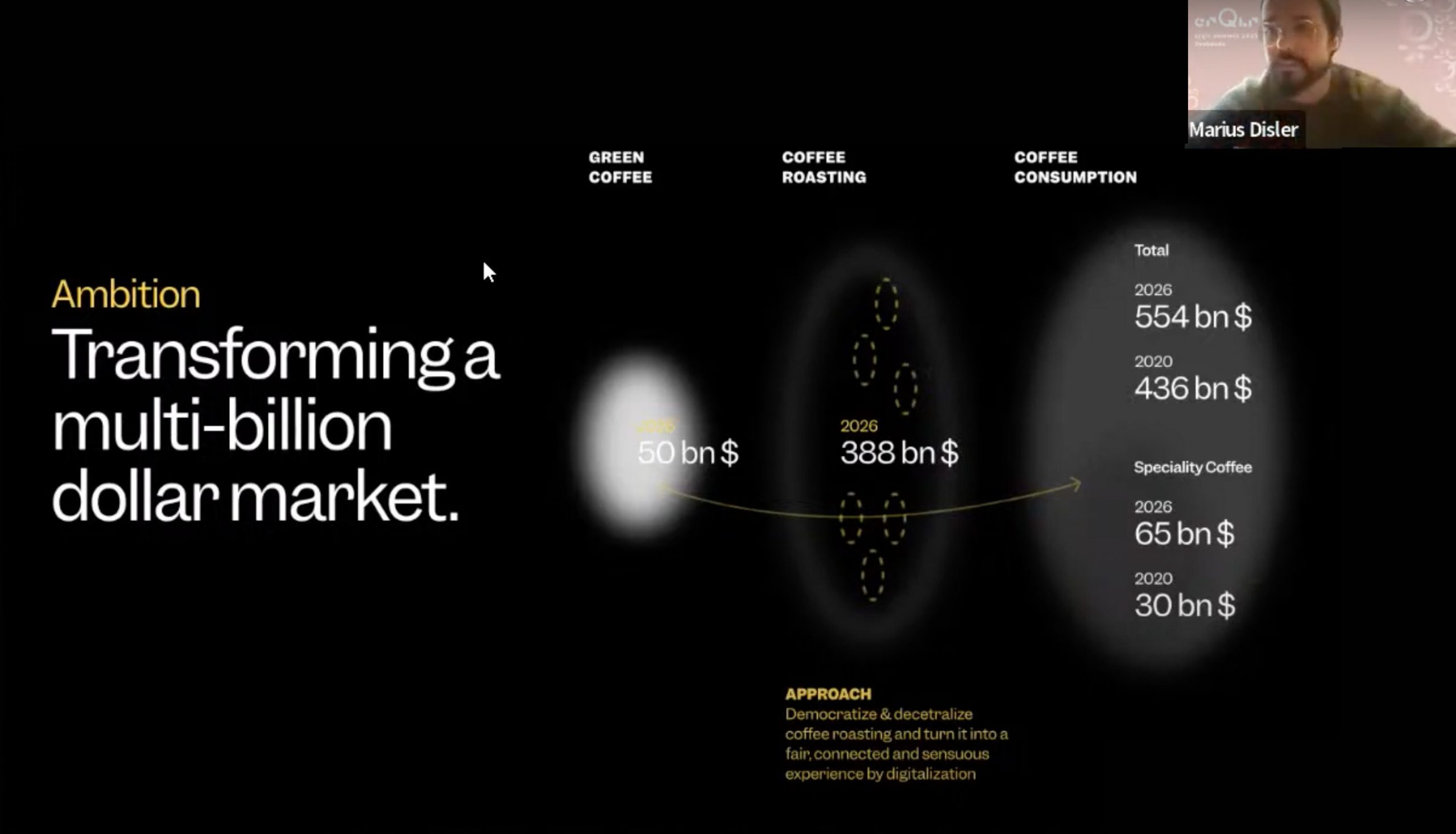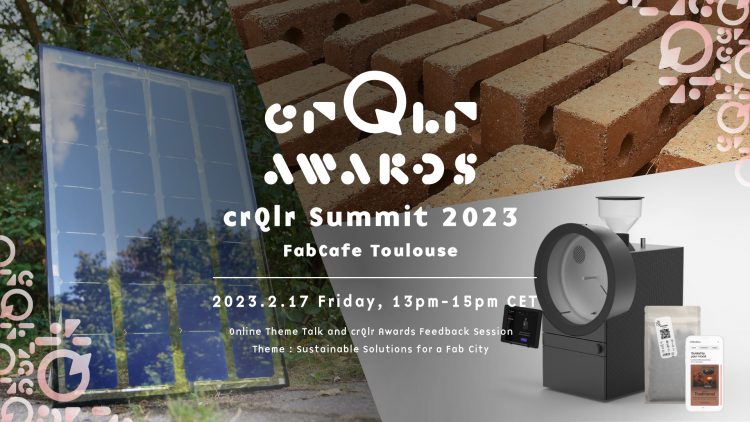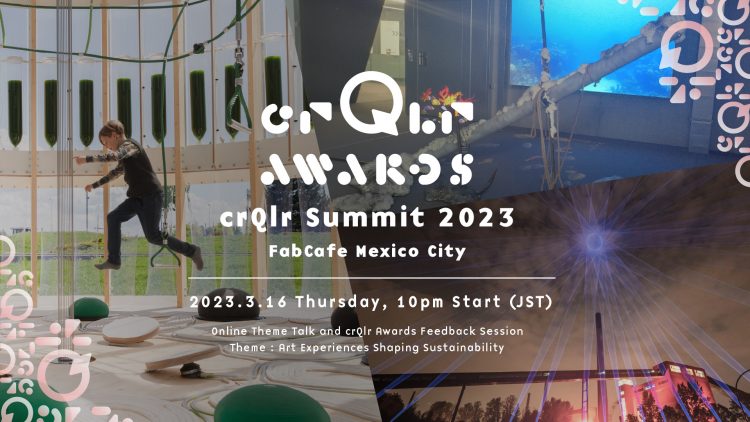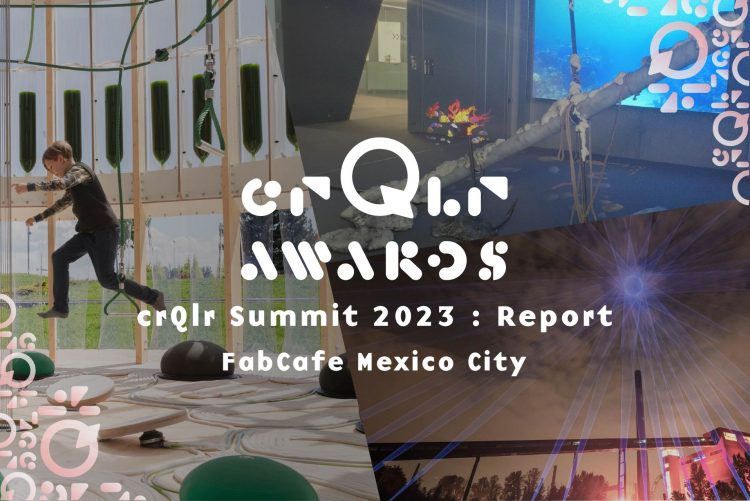Event report
April 2, 2023
David Willoughby
Freelance Writer
The second annual crQlr Awards saw 131 applications from 30 different countries. More than 50 prizes were awarded, the idea being to highlight the diversity of people and projects on the global frontlines of circular design. Judges and winners come together at the crQlr Summits – this year held in Japan, Toulouse and Mexico City – for an exchange of feedback and to catalyze the projects in question. More than that, the summits are an opportunity to share and exchange best practice across the entire circularity movement.

The Toulouse Summit on February 17th, 2023 was hosted by FabCafe Toulouse and structured around the Fab City concept of localizing production and consumption. How might we move away from global supply chains and make local areas lively again? Three of the winners stepped forward to share what they’ve learned. But first, let’s meet the judges.
Lingchih is a veteran of the Fab movement. In 2009, she co-founded Artilect, France’s first FabLab, with her partner Nicolas Lassabe. In 2015, the pair co-founded FabCafe Toulouse in the center of the ancient French city. Speaking from FabCafe Toulouse’s very own medieval cave, Lingchih explains her involvement in the Fab City project, which aims to use digital fabrication methods to create smarter, more sustainable cities. (Lingchih and Nicolas actually helped launch the Fab City concept at Fab14 in Toulouse.) While conventional cities import most of what they need, residents of a Fab City can download a set of instructions for almost anything and go to a maker space or FabLab to create it. Fab Cities around the world can also help each other by sharing all the data they create. There’s a neat acronym for this: going from a PITO (Product In, Trash Out) model of the city to a DIDO (Data In, Data Out) model instead. The big idea, Lingchih explains, is to replace many of our global supply chains with city-level or neighborhood-level production.

Amorpol joins us from Bangkok, where his company moreloop is introducing circularity practices into the textile industry. Amorpol describes how he quit his job in finance and joined with a second-generation garment-maker to tackle the issue of surplus fabric resulting from defects and intentional over-ordering. In Thailand alone, this extra fabric would be enough to make 700 million extra t-shirts a year. The solution they came up with is moreloop, an online marketplace that connects garment factories with SMEs and entrepreneurs, as well as upcycling and producing its own-brand items. Founded in 2018, moreloop has already upcycled nearly 200,000 yards of fabric. Amorpol initially pursued his own vision to solve the linear economy, so he was excited to discover the crQlr Awards, which he describes as “not one person or company, but several hundred companies trying to do the same.”

Yeliz describes herself as a social designer or catalyst. In her role at the non-profit Global Landscapes Forum, she helps to disseminate knowledge of “landscape approaches” to building sustainable places. Similar to the Fab City, landscape approaches involve connecting local production and consumption, the ultimate goal being, in her words, “to create resilient and vibrant landscapes instead of degraded landscapes or monocultures.” The GLF works with over 30 development agencies and has been organizing conferences and educational programs for ten years. Yeliz sees a clear parallel with the crQlr Awards as they both involve democratizing knowledge. In her case, this means using a digital platform to channel scientific knowledge into communities which can put it into practice.

Biosphere Solar won several prizes at the crQlr Awards 2022 for its bold approach to disrupting the solar industry with a fair and circular solar panel. Co-founder Perine Fleury joined the Toulouse summit to talk about an industry beset with a range of problems, including a near-total reliance on non-recyclable materials and the use of forced labor in its supply chains.

Taking inspiration from the Solar Punk movement, Biosphere Solar asks us to imagine a better future in which communities use open-source hardware to produce only enough energy for their own needs. The company is now prototyping a development kit for its modular solar panels and sourcing alternatives to conventional solar glass. Perine explains why they chose the business model known as steward-ownership and recommends this to other people looking to start impact-driven companies:
Steward-ownership is a very good way of structuring your company so that you can still make a profit but also make sure that your mission is not compromised by this profit-oriented mindset. Essentially, we have a foundation that owns a for-profit private limited company, and this type of ownership will also enable us to diversify our actions if we decide we want to do Biosphere Water, for example, or Biosphere Habitats.
– Perine Fleury, Co-founder, Biosphere Solar
Later, the judges were invited to share feedback:
Being a pioneer is not easy. There are still some questions in sustainability that people don’t like to ask. They don’t like to go as deep, to that little corner, because it’s just too dark there, and those are the problems that are going to haunt us in the next 20, 30, 40 years. That you approach solar panels in such a thorough way is something that I applaud.
– Yeliz Mert, crQlr Awards judge
We’re going to face a solar panel epidemic very soon. I know of a lot of companies that have millions of acres of solar panels that in 20 years they don’t even know what they’re going to do with. In Thailand, I’m part of the funding committee for the circular economy under the Ministry of Science. A lot of people are coming up with ideas for mechanically recycling solar panels, but what they’re proposing is just not really workable. To see something like this is very encouraging. I’m also interested in the stewardship that you mentioned, because coming from Southeast Asia, we’re all about capitalism! It’s good to learn about something more idealistic, more socially responsible.
– Amorpol Huvanandana, crQlr Awards judge
Before your presentation, Perine, I didn’t know the impact solar panels can have on our environment. I think it’s courageous to point out this problem to the public. And for me, it’s a very good idea because it’s very ‘maker’. We always talk about how to make it by ourselves. I want to ask: is there any possibility you can transfer your knowledge and data so we can produce the product locally?
– Lingchih Yang, crQlr Awards judge
We were really inspired by the maker movement, but what inspires us is for people to be able to make their own energy. From an environmental point of view, it actually doesn’t make sense to build your own solar panel. Our development kit is more educational. It’s a learning experience so people can know what a solar panel is, what materials in them are, and how it becomes electricity. Then they can order the different parts that they need to make their own panel, and hack it so that it adapts and fits their needs.
– Perine Fleury, Biosphere Solar
Sargablock won a Special Prize for its work transforming an environmental catastrophe into a community-based circular project. In 2018, Mexico’s Caribbean beaches were swamped by a record inundation of the seaweed sargassum, threatening to bury the local tourism industry. Omar Vázquez Sánchez, a landscaper cleaning up the beaches, had the idea to create a new building material from this biowaste, and the Sargablock was born.

Omar is no ordinary circular practitioner, which makes him all the more inspiring. He joined the summit to share his incredible life story, which includes being an illegal child migrant to the US and working as a gardener in California for 30 years, before returning to Mexico to live, as he puts it, the Mexican dream instead. That meant starting a landscaping business employing 300 people, many of them suffering from alcohol and drug related problems. The idea for Sargablock came to Omar when he was facing the loss of the business he’d built:
Two things in life made me happy: one was my grandparents’ house and the other was my mom. I thought, hey I know what I can do with the seaweed. I turned it into the Sargablock and then built a replica of my grandparents’ house and named it Casa Angelita, which was my mom’s name. The Sargablock is 100% organic and made like adobe, a handmade brick. It contains between 40-60% sargassum and the other 40-60% is organic material. I have a wood chipper, and growing up in California and Napa Valley in the wine country I learned how to make compost and things like that.
– Omar Vázquez Sánchez, Founder, Sargablock
Feedback from judges:
Omar, you took everyone’s heart with that presentation. Not because the presentation was well done, but because the work that you’ve done behind it is just so heartwarming. I’m the kind of person who wants to share knowledge in order to spur action, so you being a gardener and knowing the value of seaweed, and being able to turn that into something is the key there. Turning a problem into a solution is one of the main principles of permaculture, and I love that you use that term as well.
– Yeliz Mert, crQlr Awards judge
“Omar, you turn the problem of seaweed into something that is so lifegiving! It’s great that you keep your idealism intact. I want to learn more about how you manage growth and finances behind the scenes. Going into other countries, I’m assuming that you have quite good bargaining power with your invention to make it a good successful business for all stakeholders including yourself as an owner. I don’t have a lot of feedback except admiration and something that I want to learn from.
– Amorpol Huvanandana, crQlr Awards judge
Omar, your story is very touching and I think you are a brilliant person. Have you ever tried to use another kind of material to make your bricks? Because in Europe we don’t have a seaweed problem, but we have other difficulties. So, with your technology and your skills, is it possible to use another material and turn it into something useful for construction?
– Lingchih Yang, crQlr Awards judge
In central Mexico, we have another problem with water lilies in rivers, so I’m doing Lilyblock. I can pretty much do this with every kind of organic material. What I want to do is go to each state or country where they have a problem, be humble, and find a solution. I always say that Sargablock is a mirror of myself, because when I had problems with alcohol and drugs and I was bad for society, I let God change my life and mold it. So I can mold seaweed, I can mold water lilies, I can mold a lot of stuff, and we can make a lot of different things.
– Omar Vázquez Sánchez, Sargablock
Mikafi Roasting Platform was the recipient of the New Fair Trade Coffee Prize at the crQlr Awards. The platform, which is still being prototyped, democratizes the coffee roasting process by enabling small businesses to roast their own green coffee beans. It consists of an IoT roasting machine and an app for selecting roasting profiles. By eliminating the big roasters as the traditional middleman, Mikafi empowers coffee enthusiasts to source their own beans and roast according to their own tastes.

Mikafi co-founder Marius Disler joined the Toulouse Summit to talk more about the role of the big roasters in procuring most of the value of the coffee chain, and why this is bad for both producers and consumer choice. The global market for green coffee is worth around $50bn, but this grows to $388bn for the roasted beans. At the same time, businesses that serve coffee are limited in the selection they can provide and can’t even verify that producers receive fair treatment. When faced with deep-lying structural issues, sometimes a valid approach to circularity is to go around them and design another ecosystem instead. Marius explains how this works in practice:
We democratize the roasting process and then connect all the data from the farm to the customer. We don’t do the sourcing of the green coffee, which is really a different business, but we work together with partners and importers which fit certain sustainability criteria to have them on our platform. We also work with partners to produce the machines. We build the concept, the software, and the brand. The vision is to become a beloved distributed coffee roastery in your neighborhood.
– Marius Disler, Co-founder and CEO, Mikafi
Feedback from judges:
Marius, your product and your passion is so good in the coffee world because we have seen Starbucks rise to power in a successfully capitalistic way, but maybe they’re not the most sustainable. To see you try to revolt against this is encouraging. I’m just curious about the product differentiation. I already did a small search for a home roastery and it exists, but not in the same way as yours. It would be great to know your plans for finishing the prototype and selling it.”
– Amorpol Huvanandana, crQlr Award judge
Right now we have a finalized product for hospitality, but not for the home. From a sustainable point of view, it makes the most sense to build a machine which actually gets used and is not just put onto the shelf and used once a month.
– Marius Disler, Mikafi
I’m a coffee lover. In FabCafe Toulouse, we buy a coffee brand from the store Roselle Coffee locally. I like your idea because it cuts out the unnecessary fees for the storage and the wholesaler. We can just buy products directly from the producer.
– Lingchih Yang, crQlr Awards judge
We’re actually going to be having that opportunity in FabCafe Kyoto very soon! We’ll have to include a link to that in the report.
– Kelsie Stewart, moderator
Yes, it would be a dream to have a machine in every one of your spaces and work together with the local importers who source green coffee fair and direct from the farms.
– Marius Disler, Mikafi
Tue, April 11, 2023 – Sat, April 15, 2023
Mikafi Pop-up event “Explore the next generation coffee experience”
👉 Mikafi pop-up event at FabCafe Kyoto
About the crQlr Awards

Launched in 2021 by FabCafe Global and Loftwork as Japan’s first award in the field of circular design, the crQlr Awards aim at supporting the future-designers who are working toward the implementation of circular economy systems. Our goal is to nurture a community where players can connect across industries and countries and share knowledge and technologies in order to uncover potential and create new value.
How can we develop impactful circular systems in a wildly diverse world? FabCafe branches across different countries have proven that long lasting change often starts small and responds to the specific needs of local communities. Thus, in its second edition, the crQlr Awards have introduced the FabCafe Global Special Prize, which will highlight bottom-up activities aimed at solving community issues.
-
David Willoughby
Freelance Writer
David thinks and writes about sustainability, technology and culture, and has reported on many of our hackathons, talks and other events. He also works with Japanese companies to help tell their stories to the world.
David thinks and writes about sustainability, technology and culture, and has reported on many of our hackathons, talks and other events. He also works with Japanese companies to help tell their stories to the world.










